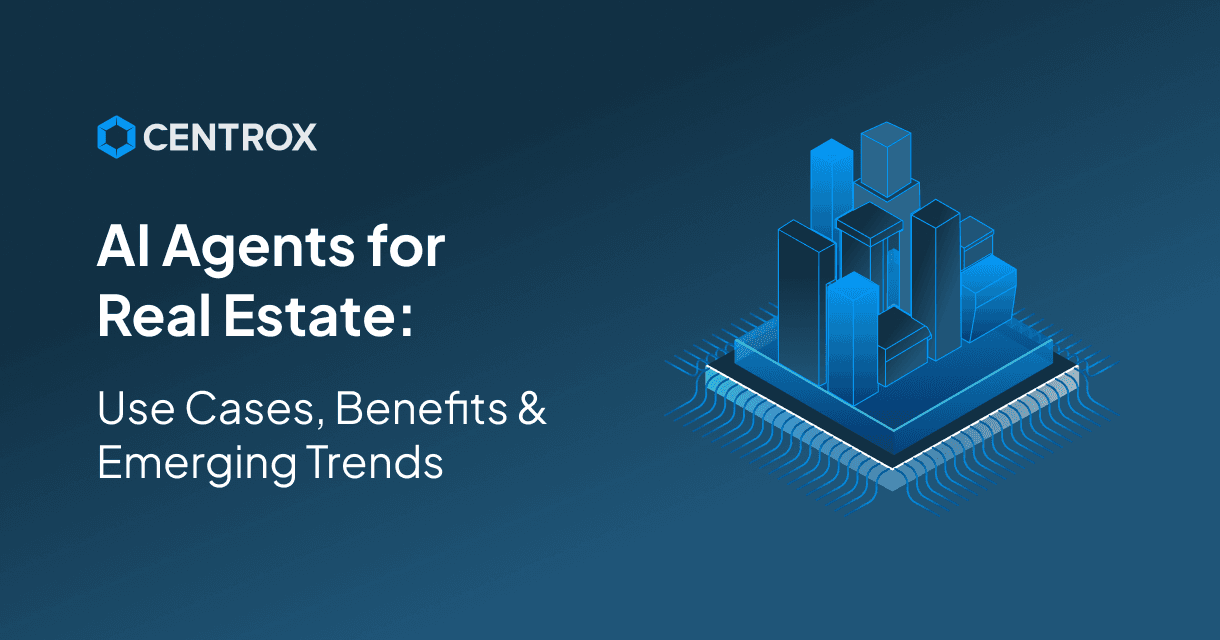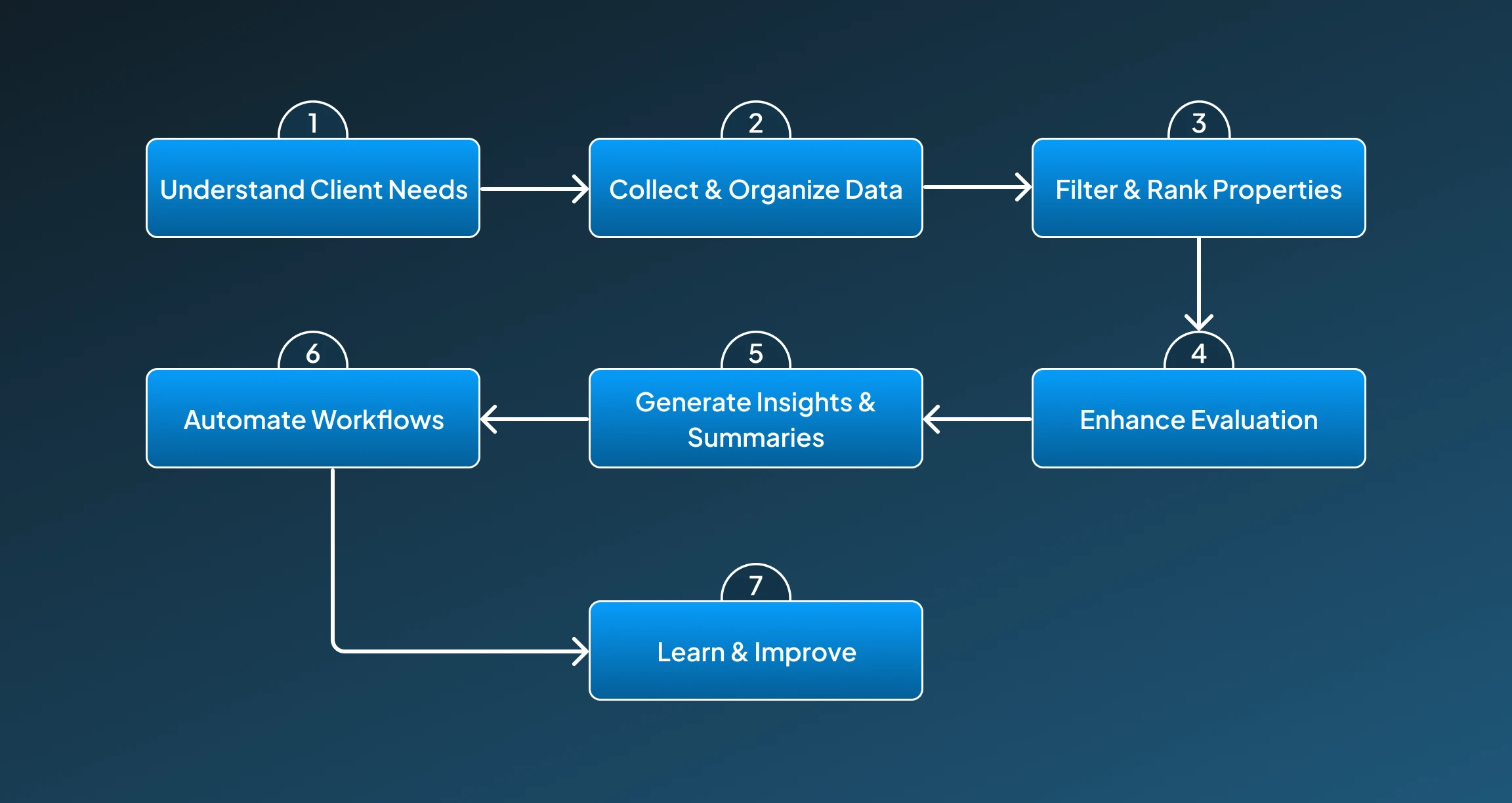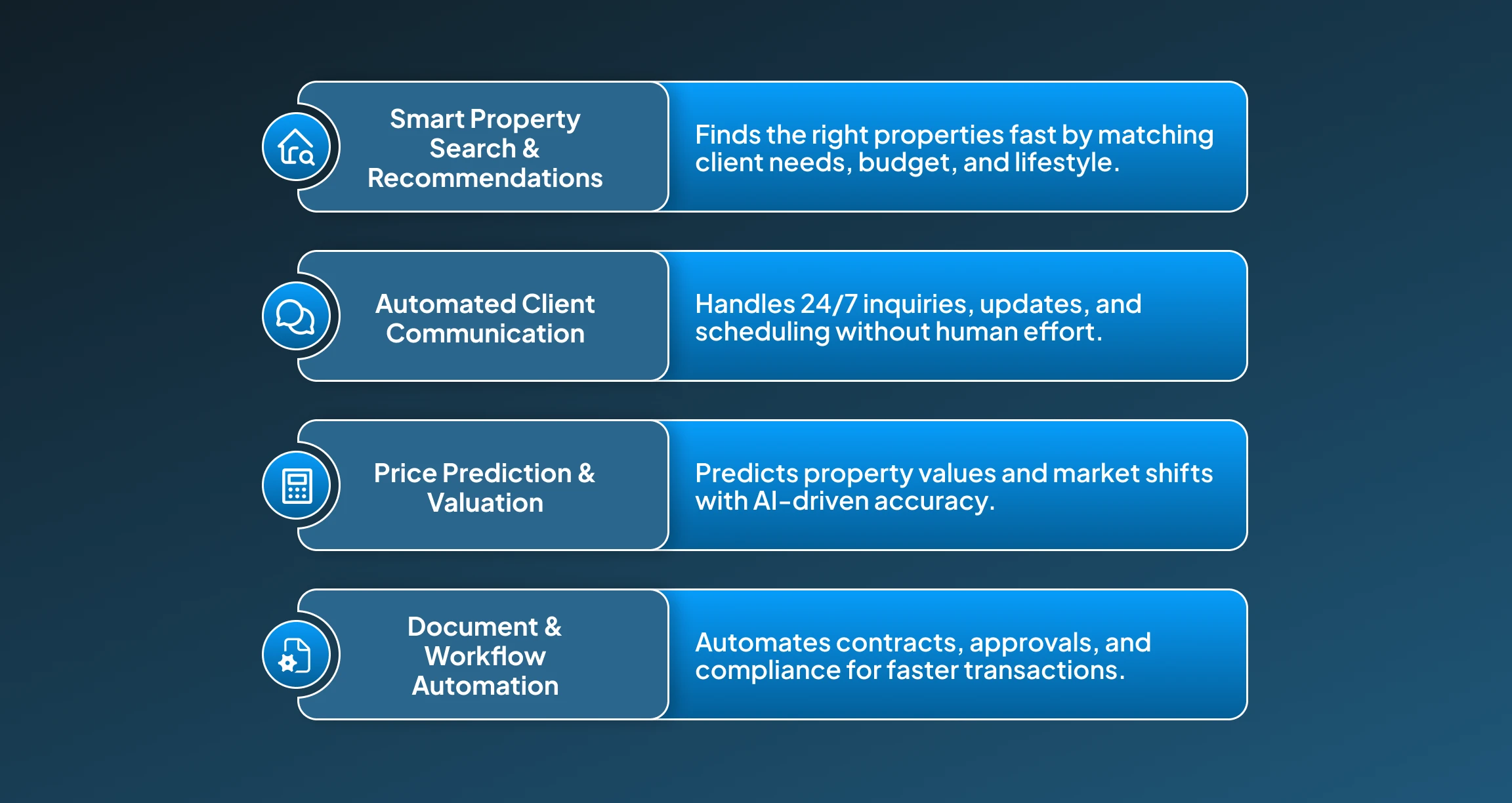AI Agents for Real Estate: Use Cases, Benefits & Emerging Trends
Discover how AI agents are transforming real estate with improved customer experiences, key components, and real-world use cases.
8/25/2025
artificial intelligence
6 mins

The traditional ways of getting your daily responsibilities done in the real estate industry is slowly getting outdated because of their inefficiency in carrying a heavy workload with the same consistency. Here, having an AI agent in the real estate process appears as a reliable futuristic idea that will allow real estate businesses to focus on elevating their growth.
An AI-driven solution for real estate enables a more structured and intelligent execution of daily operations. Thus, it encourages real estate businesses to prioritize their concentration on strategizing and planning their implementation accordingly.
In our blog, we will explain the core thought behind AI agents in real estate, their impact, key components, and use cases. This will assist you in getting an overview of how AI agents can benefit your real estate business by driving profit and success.
AI Agents in Real Estate
AI agents in real estate help extend AI-powered solutions that perform property searches, automate client communications, analyze market trends, predict prices, and manage listings. By performing such duties, AI provides personalized customer experiences, speeds up transactions, minimizes effort on manual tasks, and supports smarter decision-making for buyers, sellers, and agents.
How can AI agents impact real estate operations?
AI agents in real estate might have sounded like a futuristic idea a few years ago. But today, it is transitioning into a necessary need for ensuring the smarter execution of workflows. AI agents in the real estate sector can simultaneously handle multiple workflows without disrupting the experience for anyone in them. It automates tasks like file search, customer interaction, analysis, and price prediction, making the journey convenient for buyers and sellers. Kai-Fu Lee(CEO of 01.AI) says:
“Real estate is being transformed by AI’s ability to process vast data, predict trends, and personalize client interactions, agents who embrace it will gain a decisive edge.”
Key Methodology of AI Agents in Real Estate
AI agents powering real estate applications have some methodology working on the back end. These core components work in collaboration, ensuring that the expected requirements are being fulfilled accordingly. To provide you with clear insight about how these AI agent-driven solution works for real estate, we have provided you with a brief overview:

Step 1: Understand Client Needs (NLP + CRM)
AI agents initiate their cycle of work by interpreting client queries through NLP; furthermore, they enrich them with CRM history, preferences, and budget. By doing this, it extends personalized recommendations by combining stated intent with past behaviors and stored client context.
Step 2: Collect & Organize Data (APIs + MLS + Market Feeds)
After understanding the query, the next task that these AI agents execute is about collecting and organizing data. For this purpose, it integrates live data from MLS, property records, mortgage rates, and neighborhood statistics. By combining different feeds, they build a complete picture of available listings and relevant market conditions.
Step 3: Filter & Rank Properties (Rule Filters + ML + Recommendation Engine)
Once the data collection and organization are completed, the next step in line is applying AI filtering. This can be done by utilizing AI hard rules like price and location. After this, the ML models' scores and rank options prioritize homes that match with user's preferences, lifestyle needs, and buying potential.
Step 4: Enhance Evaluation (Computer Vision + Predictive Analytics)
Then, for enhancing evaluation results, computer vision and predictive analytics are applied. Such processes help in understanding the visual properties of photos by identifying features and defects. This helps both the buyer and seller to make decisions by evaluating price and value fairness according to market trends..
Step 5: Generate Insights & Summaries (NLG)
After enhancing the evaluation, the natural Language Generation starts generating clear, easy-to-understand property briefs. These generated summaries also contain explanations of why a property is recommended, highlighting its strengths, weaknesses, and providing actionable insights, helping the clients and agents save their valuable time.
Step 6: Automate Workflows (RPA)
Robotic Process Automation integration here helps in scheduling viewings, managing communication, drafting documents, and updating CRMs automatically. This reduces the effort required for repetitive tasks, streamlines workflows, speeds up transactions, and allows agents to focus on relationship-building and negotiations.
Step 7: Learn & Improve (Feedback Loop)
Finally, the system then becomes able to continuously learns from user actions, feedback, and outcomes. It further adjusts recommendations, enhances accuracy, and personalizes experiences, ensuring smarter property matches and more efficient workflows over time.
Use Cases of AI Agents in Real Estate
An AI-agent-powered solution can prove to be revolutionary for the future of the real estate industry. Such a solution can automate tasks, improve client experiences, and enable data-driven insights. These solutions can handle the entire customer cycle, from smarter searches to seamless transactions. Below are five key use cases transforming the sector.

1. Smart Property Search & Recommendations
With an AI agent solution, real estate businesses can perform personalized searches as it can efficiently understand client preferences, budgets, and lifestyle needs. Instead of providing generic listings as a response, this tool delivers highly relevant property options, saving buyers and renters time and effort.
Industry Example: Zillow
2. Automated Client Communication
In today's era, where both customers and service providers are running short on time, such a solution provides virtual AI agents to handle 24/7 inquiries, schedule property tours, send updates, and answer FAQs. Through this, it assists the client in ensuring immediate helpful responses, improving customer experience while reducing workload for human agents.
Industry Example: Compass Real Estate
3. Price Prediction & Valuation
Using ML and predictive analytics allows such AI agents to make accurate estimates of property values, forecast market shifts, and intelligently suggest competitive listing prices. By providing such listings, it helps both the buyers and sellers to make data-driven, smart decisions.
Industry Example: Housecanary
4. Document & Workflow Automation
AI-agents-powered tools can also streamline paperwork, contracts, mortgage pre-approvals, and compliance checks. It can stand as a single solution to automatically manage workflow for document handling, eventually speeding up transactions, reducing errors, and ensuring smoother workflows for agents, buyers, and lenders.
Industry Example: Skyslope
Closing Thoughts on AI Agents in Real Estate
AI agents are no longer futuristic add-ons; they are becoming essential partners in real estate. By streamlining property searches, automating workflows, and enabling accurate price predictions, they empower agents, buyers, and sellers to work smarter.
To stay competitive, real estate professionals should begin adopting AI-powered tools for customer interaction, explore predictive analytics for pricing strategies, and automate repetitive documentation processes.
Buyers and sellers, on the other hand, should leverage AI-driven platforms to save time and make data-backed decisions. The key insight: those who embrace AI agents now will lead tomorrow’s real estate market with efficiency and trust.
Is your business struggling with growth due to manual workflows? Discuss with our expert engineers at Centrox AI how AI agents can help you boost your sales and profits, while encouraging you to invest your valuable energy in strategizing.

Muhammad Haris Bin Naeem
Muhammad Harris Bin Naeem, CEO and Co-Founder of Centrox AI, is a visionary in AI and ML. With over 30+ scalable solutions he combines technical expertise and user-centric design to deliver impactful, innovative AI-driven advancements.
Do you have an AI idea? Let's Discover the Possibilities Together. From Idea to Innovation; Bring Your AI solution to Life with Us!
Your AI Dream, Our Mission
Partner with Us to Bridge the Gap Between Innovation and Reality.
